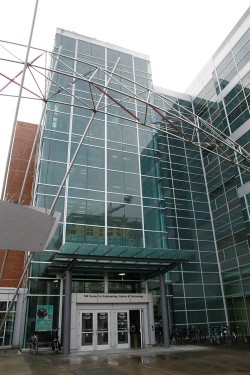Portland State students interested in environmental preservation are highly recommended to attend the Feb. 1 Solutions Seminar hosted by the Institute for Sustainable Solutions. Titled “Getting what you pay for: tracking ecosystems in the Northwest,” the seminar will focus on how the Willamette Partnership contributes to the preservation of the Northwest’s many ecosystems.
Sustainable seminar promises innovative ideas
Portland State students interested in environmental preservation are highly recommended to attend the Feb. 1 Solutions Seminar hosted by the Institute for Sustainable Solutions. Titled “Getting what you pay for: tracking ecosystems in the Northwest,” the seminar will focus on how the Willamette Partnership contributes to the preservation of the Northwest’s many ecosystems.

The event will take place at the Shattuck Hall Annex, from 5 to 6:30 p.m., and is free to students and the public. Additionally, it will be streamed live on the PSU website. This will be the fourth in a series of 10 seminars held during winter term that are sponsored by PSU and the ISS. All of the seminars will carry the theme of environmental protection.
Bobby Cochran, executive director for Willamette Partnership is this event’s speaker. He is a graduate of PSU who received both a master’s and doctorate in the fields of urban studies and conflict resolution. He also received a master’s degree in public policy from the University of Southern California.
“Bobby specializes in developing collaborative policy tools and approaches at the intersection between economics, technology and the environment. He’s sometimes accused of wearing rose-colored glasses, but he’s still convinced those are cool,” said Fletcher Beaudoin, sustainability partnerships director with the ISS.
Cochran’s work has focused on the fields of water preservation, international solutions and the organization of environmental agencies. He has extensive experience in the field of nature preservation and works to encourage others to share in his mission.
According to Beaudoin, Cochran will speak about the trends seen in ecosystem investments and spending in the Northwest. He will be presenting various new ways to look at how “we could be more efficient and effective with that spending.” Beaudoin said that Cochran’s ideas “focus on outcomes for nature that can be measurable.”
“Bobby will be also talking about an innovative approach to conservation that presents a series of powerful outcomes for expenditures on conservation as well as the outcomes,” Beaudoin said. According to Beaudoin, students who have interest in sustainability practices and want to find new ways to undertake conservation projects will benefit from Cochran’s seminar. “Students will be interested to hear about this cutting-edge work and how Oregon is playing a major role in the region,” Beaudoin said.
Cochran’s affiliated nonprofit organization, WillamettePartnership, fights for proper funding of projects that sustain healthy ecosystems, encourages businesses to not only “tolerate” environmentally friendly practices but actually promote them, and works to create a way for all people to have their own individual opportunity to help the environment.
The organization consists of representatives from a variety of environmentally friendly local agencies, including Clean Water Services, the Oregon Business Council, Defenders of Wildlife, Willamette Riverkeeper, the Oregon Association of Nurseries, the Oregon Association of Conservation Districts, the Network of Oregon Watershed Councils, Portland’s Bureau of Environmental Services, Wildwood, Inc., The Conifer Group, Weyerhaeuser, and SOLV, as well as law firms and educational facilities in the area. These groups are united in their quest to provide a healthier environment for the world, and their representative at the seminar will be offering suggestions on how to succeed in that mission.
“Every time you ask people, they almost always say how much they value clean air, clean water, and natural places to play. Then why do we have such a hard time making the investments so ecosystems can provide those things to us?” said Cochran.
Cochran sees the problem in the tremendous amount of money spent “to address the problems of 1970—when the Cayuhoga River was catching on fire.” Much of current environmental legislation resulted from those problems. “That’s when we got the Clean Water Act, Endangered Species Act, etc. But if we stepped back and asked mother nature how she would spend $100 million, she might have some different ideas,” Cochran said.
“That’s where the concept of ecosystem services and incentives can help. The Willamette Partnership is a conservation coalition that tries to help steer additional investment and action in the things that really matter—the work that mother nature would have us do,” Cochran said.
Cochran advises PSU students to attend the seminar, as he believes that they will discover new truths about the environment and ways they can help preserve it. “It’s a way to come hear about what’s going in Oregon tied to the environmental impacts of urban and energy development, how to incentivize more sustainable agriculture, et cetera,” Cochran said.


